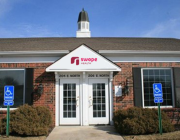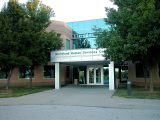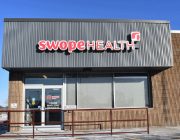March is Colorectal Cancer Awareness Month, as designated by the World Health Organization’s International Agency for Research on Cancer, and in the United States, by the national Colorectal Cancer Alliance.
The month is observed to highlight the importance of screening for colorectal cancer, which is the third most common type of cancer worldwide. It also is the second most common cause of cancer death.
Yet colorectal cancer can be prevented or detected with screenings. The most effective treatments for colorectal cancer occur when it is found in early stages.
At Swope Health, our physicians recommend colorectal cancer screenings starting at age 45, or earlier if you have a family history of the disease. The key to know: EVERYONE – all men and women – should be screened.
“When you meet with a doctor at Swope Health, we always ask about your medical and social history,” said Dr. Naiomi Jamal, Chief Health Officer. “This helps us evaluate your risks for the disease. We want to manage the risks and help prevent disease, that’s why we encourage screening for everyone starting at age 45, sooner if there is a family history.”
You should know colorectal cancer is increasingly appearing at earlier ages, although scientists are not certain why this is happening. The rates of colorectal cancer in people under age 50 have increased 2.2 percent each year from 2007 to 2016. In 2019, 20 percent of colorectal cancer diagnoses were in people younger than 55, says the American Cancer Society.

The National Cancer Institute is researching many factors to understand more about colorectal cancer and current trends. Those factors include diet, obesity, bacterial toxins, and environmental chemicals.
Healthy lifestyle choices can decrease the risk of colorectal cancer. Some of the best behaviors you can adopt are the same ones you frequently hear from healthcare professionals – avoiding alcohol and smoking, maintaining a regular exercise routine, and eating nutritious foods to maintain a healthy weight.
What is colorectal cancer?
Colorectal cancer refers to cancers of the colon or rectum, which are parts of the digestive system. Sometimes abnormal growths, called polyps, form in the intestine or bowel and over time some may turn into cancer, says the Centers for Disease Control and Prevention.
According to the Colorectal Cancer Alliance: Colorectal cancer can develop silently, so there may be no symptoms until it has advanced to later, and more deadly, stages. Symptoms to look for include a change in bowel habits, rectal bleeding, abdominal discomfort, weakness and/or fatigue and unexplained weight loss.
If you experience any of these symptoms, you should talk with a healthcare provider.
When do I get screened?
Your personal history and your risk factors will determine when you should start getting checked. For most people, it’s at age 45.
If you have risk factors, you may need earlier screening. For example, if you have had cancer, ulcerative colitis or inflammatory bowel disease, or have a family history of colorectal cancer, you should be screened earlier. African Americans are 20 percent more likely to have colorectal cancer, and the highest death rates from colorectal cancer, according to the American Cancer Society.
How do I get screened for colorectal cancer?
There are several types of screenings, from at-home test kits to a colonoscopy, which is a procedure involving the examination of the interior of the colon. The colonoscopy requires a day of advance preparation, including no solid foods the day before and only clear liquids. It may also require a laxative to clear out your stomach and bowels.
Your doctor can discuss which option is right for you, based on your age and other factors.
Would you like more information about colorectal cancer and screenings? Call Swope Health and make an appointment: 816-923-5800. You can also download a PDF from the Centers for Disease Control and Prevention.
















